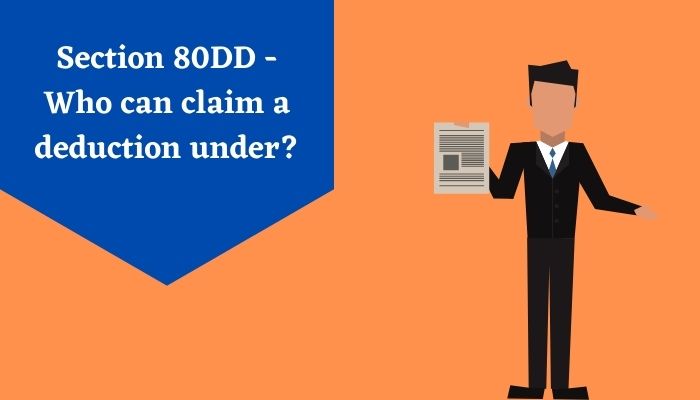Section 80U – Tax Deduction for Disabled Individuals
When it comes to saving taxes and getting tax deductions, then having a proactive approach to things goes a long way. This is why if you have decided to learn more about Section 80U of the Income Tax Act, then you are moving in the right direction.
Today, we’ll take you through what exactly this section of the Income Tax Act entails. We’ll also talk about the eligibility and the process for getting deductions under Section 80U of the Income Tax Act.
What is Section 80U?
Section 80U is a part of the income tax laws of India that provides tax benefits to individuals. This tax benefit is provided to individuals if they or their family members are suffering from certain types of disabilities.
It should be noted that Section 80U offers tax benefits if an individual is suffering from a disability and Section 80DD offers tax benefits if an individual taxpayer’s dependent family members suffer from a disability.
Who Can Claim Deduction Under Section 80U?
Individuals can claim a deduction under Section 80U if they fall under the category of a resident individual who is suffering from a disability. This disability should be certified by a medical authority before one can claim tax benefits under Section 80U.
Under this section, an individual with a disability is defined as a person who has at least 40% disability that has been certified by medical authorities. Beyond this, the conditions that can be classified as disabilities are:
- Blindness
- Low vision
- Leprosy-cured
- Hearing impairment
- Locomotor disability
- Mental illness
- Mental retardation
It should be noted that severe disability is a condition in which an individual is suffering from a disability of 80% or more. Severe disabilities can include multiple disabilities like autism and cerebral palsy.
One should also remember that disabilities are primarily divided into seven categories. These seven categories are mentioned below.
Low Vision
This disability applies to individuals with visual function impairment that cannot be corrected by surgery. These individuals are still capable of using their vision by being assisted with other devices.
Blindness
Blindness is defined as the complete absence of sight or field of vision limitation by an angle of 20 degrees or worse. This condition can also refer to a visual acuity that is less than 6160 after corrective lenses.
Hearing Impairment
Hearing impairment refers to hearing power loss of at least 60 decibels.
Leprosy Cured
People who have been cured of leprosy but who have lost sensation in feet or hands or paresis in eyelids and eyes fall in this category. Also, senior people or people with extreme deformities that obstruct them from performing any beneficial occupation can be classified as leprosy cured.
Mental Retardation
People who have incomplete or arrested development of mental capabilities that results in subnormal intelligence levels fall under this category.
Locomotor Disability
Locomotor disability refers to people with severely limited movements of limbs because of disability of bones or joint muscles.
Mental Illness
Other mental disorders that are not related to mental retardation fall under this category.
Deductions Applicable Under Section 80U
It should be noted that a deduction of INR 75,000 is allowed for individuals with disabilities and a deduction of INR 1,25,000 is allowed for individuals with severe disabilities. Apart from the certificate that certifies the disability, there are no other documentations that are required for applying for these deductions.
But one must remember that the certificate must be from a recognized medical authority in Form 10-IA. There is also no requirement of producing bills for the cost incurred for the pursuance of treatment or other medical expenses.
For making a claim under Section 80U, an individual must submit the medical certificate that indicates their disability together with the income tax returns. This is according to Section 139 for the relevant financial year.
If the disability assessment certificate has expired, then one can still claim deductions in the year in which the certificate has expired. One should remember that a fresh certificate would be required in the succeeding year if one wishes to enjoy the deductions under Section 80U in the following year.
It should also be noted that the disability certificate should be obtained from medical authorities who are either classified as a neurologist with a degree of Doctor of Medicine (MD) in Neurology or a civil surgeon or Chief Medical Officer in a government hospital. In the case of children, getting a certificate from a pediatric neurologist having equivalent degrees will work.
What if the disability is temporary and requires reassessment after a certain period of time? In those cases, the certificate validity starts from the assessment year relevant to the financial year during which it was issued. The certificate end date is during the assessment year that is relevant to the financial year when the certificate expires.





























